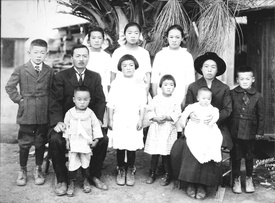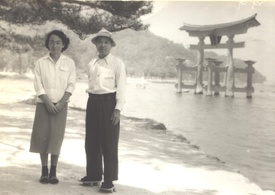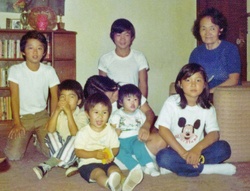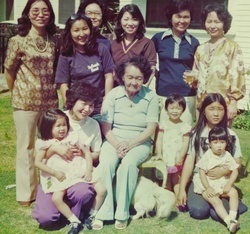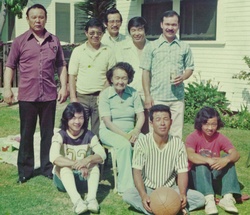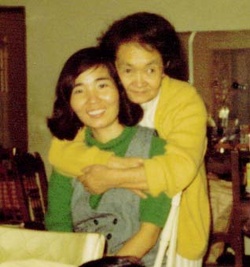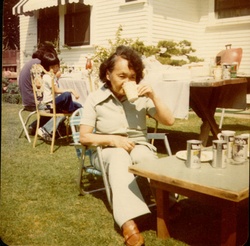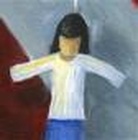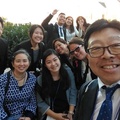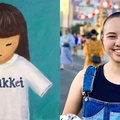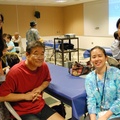My maternal grandmother’s birthday was on May 11th, so even though it’s been almost 15 years since she’s been gone, I still think about her every Mother’s Day.
My Omoto Ba-chan was born in 1908 in Southern California. She was the oldest of nine children, although I later learned that my great-grandmother actually had 11 children—the 10th child was stillborn and both her mother and the last infant died in childbirth.
She married my grandfather and had six children before World War II and E.O.9066 forced them into the concentration camps. The last two kids were born in the camps—my mother was born at Rohwer and my Uncle Mako was born at Tule Lake. Sometime during the war, my grandfather was sent to the Santa Fe Department of Justice camp. For some reason, I always thought it was because he taught Japanese language classes, but my Uncle Tak recently told me it was because he used to listen to a pro-Japanese radio program and was supportive of the Emperor.
From Tule Lake, they renounced their citizenship and was sent back to Japan after the war. My Oji-chan was from Hiroshima, so they went back there. But, the area was devastated by the atomic bomb, and although his family’s home was spared from the blast, his brother was already living in it with his family. It must have been hard to have a family of ten suddenly move in. For my Oba-chan, although she grew up in a Japanese community, she still grew up in America, and so moving to Japan and into a Japanese household was a difficult adjustment. They soon moved out and found a place on Miyajima.
They were extremely poor and faced many hardships. I heard stories of how my Oba-chan would walk along the dirt path across the island to take the ferry to Hiroshima where she would barter belongings for food. She would sometimes hide from her children when they came home from school for lunch because she was so ashamed that she had nothing to feed them. Somehow they survived. When they became older, their children began to move back to the United States, and my grandparents eventually did too.
By the time I was born, my Oba-chan was already 63. My Oji-chan had passed away already. Growing up, I knew little about her past hardships and struggles. To me, she was my Omoto Ba-chan who didn’t talk a lot, but read voraciously, loved to laugh, and spend time with family. Our family gathered together often, and my sister and I grew up playing with our cousins that were close to us in age. We got together for Easter, Mother’s Day, Thanksgiving, Christmas, New Year’s Eve, and many occasions in between. They were happy times with family, food, and games.
For her 88th birthday, we had a big birthday for my Ba-chan at a restaurant in Los Angeles' Chinatown. In Japan, the 88th birthday, called "beiju" because the kanji for "88" resembles the kanji for "rice," is a significant milestone. In addition to our family, guests included most of her siblings and family friends. At the party, my sister and I asked people to write down their favorite memories of my grandmother.
Here's what I wrote: “Growing up, I remember Ba-chan spending the weekend & watching me & June on Friday nights while our parent went bowling. We used to play ‘school’ & she would do the homework I ‘assigned’ since I was always the teacher & June & her were my students.”
My sister wrote: “Jawbreakers...her sweaters with candy, or tissues...cookies. Always poking or tickling us! I remember Ba-chan as always happy, and with us.”
My cousin Tami who is one year younger than me wrote: “When Wes and I were growing up, we were really bad. Bachan would try to spank us and we would run away. The crazy thing is that Bachan would chase after us! Through the kitchen, down the hall, over the couch! I think those were the best memories of Bachan. She may have been old, but she could sure run! :) ...Oh! and another thing: jawbreakers, of course. Bachan used to suck on them first to make them small so that we wouldn't choke on them. It wasn't until I was old enough to have my own box that I found out that jawbreakers had color!”
Her younger brother Wes wrote: “I remember playing cards, during my summer vacation. We would play card like ‘Go Fish’ or ‘Old Maid,’ while watching soap operas. I also loved her cooking.”
Auntie Reiko, who was the oldest of her children, wrote: “When I lived in Georgia, Mom visited me several times. She loved to go to bingo. I would get home from work and dinner will be all ready, she would say, ‘Hurry up and eat so that we could go play bingo.’”
My cousin John, Auntie Reiko’s son and the oldest grandchild, wrote: “During summer vacation, I used to visit Ba-chan and Oji-chan in Miyajima. I remember we used to walk to a town to do shopping & visit Katsu. It was a long walk, but Ba-chan kept a fast and steady pace that I could hardly stay pace with her.”
Auntie Diane wrote: “Mochi & Mom—they go hand-in-hand. Abazzaba—True Confessions—Jaw Breakers”
My cousin Kiyomi wrote: “What I remembered the most ‘bout bachan is how scared she was to come out of the bedroom when I went into labor with Aiko, she kept peeking out and asking if I was OK. What I remember most are her soap operas, coffee breaks, love magazines & Jawbreakers. She loved those love magazines when ever we used to go to Sav-ons the cashier looked at me weird so I was wondering' why ‘til I noticed that we were buyin' bachan's love magazines, the cashier thought that they were mines, I told her that they were bachan's but they wouldn't believe me, guess they figure old people aren't interested in romance magazines, little do they know, they just dunno bachan like the rest of us.”
My cousin Kathy wrote: “When I was about four years old, Obachan used to live on 5th Ave in an apartment with Kiyomi and Uncle Mako. One day I decided to put cherry seeds in my nose. I've never seen Obachan as angry and panicked as I did that day. She tried to use a chopstick to get the seeds out. She was screaming at me and I was screaming in pain! I also remember all her candies, love magazines, and trashy newspapers.”
A friend of the family wrote: “When Obachan would babysit my brother and me I remember we would play on the steps outside of the second story door. We would try to go down to the bottom and Obachan would catch us trying to sneak down. Then she wouldn't let us play outside anymore. But then she would feel sorry for us so she would give us candy or a toy and that would make us happy again.”
My cousin Ted wrote: “My fondest memories of Obachan happen just about every time I see her. There is a certain twinkle that she gets in her eyes when we see each other. I think before, it was because I was her grandson. As I grew older, we started having lots of fun playing with & teasing each other, trying to make each other laugh. Even now, when Obachan no longer knows who I am, there is still a twinkle in her eyes & a big smile when I see her because she seems to sense that I am going to tease her & make fun of her & that we are going to have a great time! And we do!!!”
Looking back, I'm so glad we did that. Reading these shared memories of her always brings a smile because they so perfectly capture how I remember her…with a teasing twinkle in her eye, never bitter about her past, always reading (newspapers, books, romance magazines,…), and despite all that she had survived, covering her eyes when the characters of her favorite soap operas fought on-screen. Her love of hard candies, bad memory, and love of family…there’s a lot of her that I can see in myself.
Happy Mother’s Day (and belated birthday) Ba-chan!
© 2012 Vicky Murakami-Tsuda


